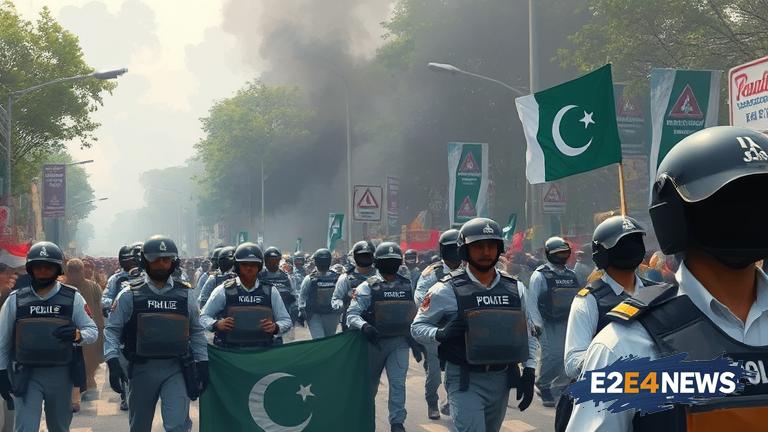The capital city of Pakistan, Islamabad, has been placed under Section 144, a law that prohibits public gatherings and rallies, in anticipation of a possible protest by the Pakistan Tehreek-e-Insaf (PTI) party. The move is aimed at maintaining law and order in the city, as tensions rise amidst rumors of a PTI-led demonstration. The PTI, led by former Prime Minister Imran Khan, has been vocal about its opposition to the current government and has hinted at taking to the streets to express its discontent. The imposition of Section 144 has sparked concerns among residents and human rights activists, who fear that the move may be used to stifle freedom of speech and assembly. The government, however, maintains that the decision is necessary to prevent any potential unrest and ensure the safety of citizens. The PTI has been critical of the government’s handling of various issues, including the economy and corruption, and has called for fresh elections. The party’s leadership has also accused the government of trying to silence its voice and suppress its supporters. As the situation remains tense, the authorities are on high alert, with security personnel deployed in key areas of the city. The PTI, on the other hand, has urged its supporters to remain peaceful and avoid any confrontation with the law enforcement agencies. The party’s leaders have also assured that they will follow all legal procedures and obtain necessary permits before holding any rally or protest. Despite the assurances, the government remains cautious, and the imposition of Section 144 is seen as a precautionary measure to prevent any untoward incident. The move has also been criticized by opposition parties, who see it as an attempt to curb democratic freedoms. The human rights commission of Pakistan has also expressed concerns over the imposition of Section 144, stating that it may be used to target political opponents and silence dissenting voices. The situation in Islamabad remains volatile, with both the government and the PTI engaged in a war of words. The PTI has accused the government of trying to intimidate its supporters, while the government has warned the party against violating the law. As the standoff continues, the people of Islamabad remain anxious, unsure of what the future holds. The city’s businesses and educational institutions have also been affected, with many choosing to remain closed until the situation normalizes. The international community is also watching the situation closely, with many countries and organizations calling for calm and restraint. The United States, the European Union, and the United Nations have all issued statements urging the parties to engage in dialogue and resolve their differences peacefully. The situation in Islamabad is a reminder of the challenges faced by Pakistan, a country that has struggled with political instability and unrest for decades. The imposition of Section 144 is a stark reminder of the government’s willingness to use force to maintain law and order, even if it means curbing democratic freedoms. As the situation continues to unfold, one thing is certain – the people of Pakistan will be watching closely, hoping that their leaders will find a way to resolve their differences peacefully and work towards a more stable and prosperous future.





